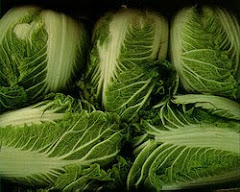There is an on-going “eat-this-not-that” commotion that confuses we hardly know now what to swallow. All we know is a little protein such as turkey, salmon and lean beef everyday won’t hurt, or so. But, in a seeming mêlée of nutrition experts over menu that packs needed nourishment, we go dumbfounded. What “high phytonutrient content?” Ah, take me to the market. Let us go find these eight food wonders.
Spinach - This noted muscle builder is a rich source of plant-based omega-3s and folate, which help reduce the risk of heart disease, stroke, and osteoporosis. Bonus: Folate also increases blood flow to the nether regions, helping to protect you against age-related sexual issues. And spinach is packed with lutein, a compound that fights macular degeneration. Aim for 1 cup fresh spinach or 1/2 cup cooked per day. Substitutes: Kale, bok choy, romaine lettuce
Spinach and Strawberry Salad
Blueberries - Host to more antioxidants than any other North American fruit, blueberries help prevent cancer, diabetes, and age-related memory changes (hence the nickname "brain berry"). Studies show that blueberries, which are rich in fiber and vitamins A and C, also boost cardiovascular health. Aim for 1 cup fresh blueberries a day, or 1/2 cup frozen or dried. Substitutes: Acai berries, purple grapes, prunes, raisins, strawberries
Yogurt - The 2,000-year-old food's health benefits are not disputed: Fermentation spawns hundreds of millions of probiotic organisms that serve as reinforcements to the battalions of beneficial bacteria in your body. That helps boost your immune system and provides protection against cancer. Not all yogurts are probiotic, though, so make sure the label says "live and active cultures." Aim for 1 cup of the calcium and protein-rich goop a day. Substitutes: Kefir, soy yogurt
Tomatoes - There are two things you need to know about tomatoes: Red are the best, because they're packed with more of the antioxidant lycopene, and processed tomatoes are just as potent as fresh ones, because it's easier for the body to absorb the lycopene. Studies show that a diet rich in lycopene can decrease your risk of bladder, lung, prostate, skin, and stomach cancers, as well as reduce the risk of coronary artery disease. Aim for 22 mg of lycopene a day, which is about eight red cherry tomatoes or a glass of tomato juice. Substitutes: Red watermelon, pink grapefruit, Japanese persimmon, papaya, guava
Carrots - Most red, yellow, or orange vege- tables and fruits are spiked with carotenoids--fat-soluble compounds that are associated with a reduction in a wide range of cancers, as well as reduced risk and severity of inflammatory conditions such as asthma and rheumatoid arthritis--but none are as easy to prepare, or have as low a caloric density, as carrots. Aim for 1/2 cup a day. Substitutes: Sweet potato, pumpkin, butternut squash, yellow bell pepper, mango
Black Beans - All beans are good for your heart, but none can boost your brain power like black beans. That's because they're full of anthocyanins, antioxidant compounds that have been shown to improve brain function. A daily 1/2-cup serving provides 8 grams of protein and 7.5 grams of fiber. It's also low in calories and free of saturated fat. Substitutes: Peas, lentils, and pinto, kidney, fava, and lima beans
Walnuts - Richer in heart-healthy omega-3s than salmon, loaded with more anti-inflammatory polyphenols than red wine, and packing half as much muscle-building protein as chicken, the walnut sounds like a Frankenfood, but it grows on trees. Other nuts combine only one or two of these features, not all three. A serving of walnuts--about 1 ounce, or 7 nuts--is good anytime, but especially as a postworkout recovery snacks. Substitutes: Almonds, peanuts, pistachios, macadamia nuts, hazelnuts
Oats - The éminence grise of health food, oats garnered the FDA's first seal of approval. They are packed with soluble fiber, which lowers the risk of heart disease. Yes, oats are loaded with carbs, but the release of those sugars is slowed by the fiber, and because oats also have 10 grams of protein per 1/2-cup serving, they deliver steady, muscle-friendly energy. Substitutes: Quinoa, flaxseed, wild rice
Now, don’t dare us to go searching for a recipe that calls for a mix of all these eight. Aiming for wellness perfection is sometimes awful. But really, shall we vow to eat “eight?” “Eight’s” definitely well and good!









